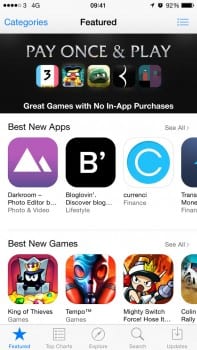Apple moves focus away from in-app purchasesApple moves focus away from in-app purchases
Apple has unveiled a new section of the iOS App Store which features games free of in-app purchasing, suggesting a move away from the vastly successful, yet at times controversial, freemium model.
February 13, 2015

Apple has unveiled a new section of the iOS App Store that highlights games free of in-app purchases, suggesting a steer away from the vastly successful, yet at times controversial, freemium model.
According to application analytics website, App Annie, 97 of the top 100 grossing applications available on Apple’s App Store in the US are both free to download and offer in-app purchases as an additional option to enhance the user experience. Only one of the top 100 grossing applications doesn’t offer in-app purchases, and that is the companion app to sandbox-based building blocks game, Minecraft, purchased in 2014 for $2.5bn by Microsoft. Incidentally, eight of the top ten grossing apps are all free to download games.

To further illustrate the business-defining value proposition of in-app purchasing, app developer King Digital Entertainment, creators of the irritatingly captivating “Candy Crush Saga”, floated last year and enjoys a market cap of around $4.5bn. Its flagship game launched in 2012, and Reuters reckons its launch was chiefly responsible for King’s unprecedented revenue growth, which boomed from $22m in Q1 2012 to $602m in Q4 2013. Again, incidentally, the game is free to download.
Having occasionally reached media headlines for all the wrong reasons in the past, freemium business models have sometimes stung the wallets of parents when their kids have unwittingly run up a bill of hundreds, if not thousands, of pounds with compulsive in-app purchasing. In September, Google agreed to settle a complaint from the Federal Trade Commission for this very reason, worth more than $19m. The case also forced a change in Google’s billing practises, to help protect parents against future in-app mishaps.
In fact, last January, Apple had to fork out $32.5m for failing to gain sufficient authorisation on behalf of the account holder before charging for in-app purchases. A complaint document published by the FTC cited:
“In connection with billing for children’s in-app charges, Apple sometimes requests a parent’s iTunes password. In many instances, Apple “caches” (that is, stores) the iTunes password for fifteen minutes after it is entered. During this process, Apple in many instances does not inform account holders that password entry will approve a charge or initiate a fifteen-minute window during which children using the app can incur charges without further action by the account holder. Through these practices, Apple often fails to obtain parents’ informed consent to charges incurred by children.”
Essentially, if a parent authorises one payment, their kid could fill their boots with in-app purchases for 15 minutes, most likely unknowingly. With some apps charging up to £100 for some purchases, eye-watering sums could easily be racked up very quickly. The FTC claims “tens of thousands of customers” have complained about such unauthorised purchases in the past 4 years.
In response, Tim Cook sent an e-mail to Apple staff, clarifying the company’s position and emphasising its corporate message. In the leaked e-mail, he said: “Apple has entered into a consent decree with the U.S. Federal Trade Commission. We have been negotiating with the FTC for several months over disclosures about the in-app purchase feature of the App Store, because younger customers have sometimes been able to make purchases without their parents’ consent.”
He later questioned the FTC’s need to intervene, saying it “smacked of double jeopardy”, and rounded off by claiming Apple has previously contacted roughly 28 million customers about the incident. Apparently, 37,000 complaints were received, with all complainants receiving reimbursements.
On the face of things, it appears to primarily come down to an awareness issue, in the sense that users are not sufficiently notified using certain apps could incur additional charges.
It is of little surprise, then, to see Apple make a move back towards the “Pay once and play” premium model. Presumably, there will be a number of battle-worn parents who will gladly oblige, breathing a sigh of relief.
About the Author
You May Also Like










.png?width=300&auto=webp&quality=80&disable=upscale)


_1.jpg?width=300&auto=webp&quality=80&disable=upscale)